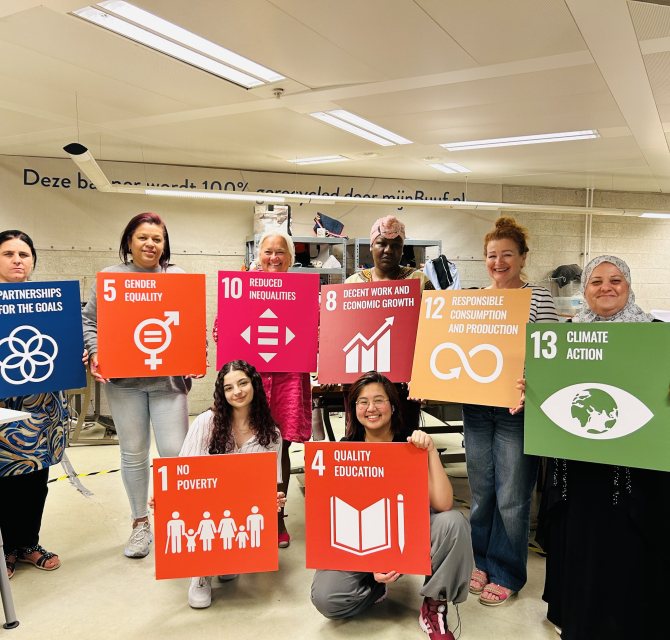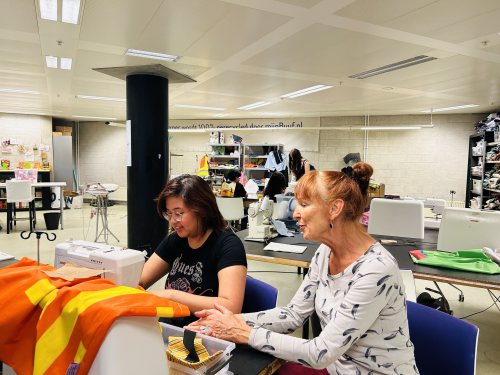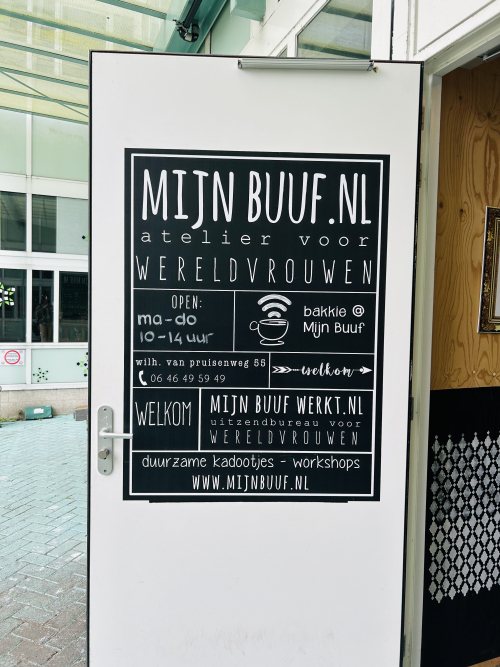
From isolation to inclusion: sustainability at My Buuf
3 June 2024
While visiting the My Buuf studio, it becomes clear how important and inspiring this initiative is. Petra P., founder of Mijn Buuf, stressed, ‘It is heartbreaking to see how isolated and lonely mothers can be while their children quickly make friends and manage themselves during sports days at Dutch sports clubs and asylum seekers’ centres.’ She added: ‘This realisation was the driving force behind the creation of Mijn Buuf, a studio that focuses on sustainability and empowering socially isolated women.’
At My Buuf, materials are reused to make new, saleable products
Petra says: ‘This is not about just tinkering, but about creating items that can be used for longer and thus really contribute to sustainability.’ In the beginning, they made what the client wanted, but now they are much more critical and only choose projects that are truly sustainable. ‘We really want to make a difference,’ Petra stresses.
The women working at My Buuf are often migrants with a small social network. ‘They are often single mothers who have fled war situations or violent marriages,’ explains Petra. ‘These women often have little education and work experience, and in their countries of origin they often did not get the chance to study because of their gender. As a result, they have few future prospects in terms of work in the Netherlands.’

My Buuf focuses on self-reliance and supporting socially isolated women, contributing to the Sustainable Development Goals (SDGs), such as SDG 1 (No Poverty) and SDG 8 (Fair Work and Economic Growth)
Petra stresses, ‘Helping these women also gives their children a better chance in the labour market. This is essential because the children of these families will be the future hands at the bedside in healthcare and will have to shape the energy transition.’
Another important aspect of My Buuf is providing quality education and reducing inequality (SDG 4 and SDG 10). Petra explains: ‘We support women in building networks and choosing the right education. Collaboration with other organisations, such as Omniversum, the National Archives and the Holland Festival, plays a crucial role here (SDG 17: Partnership to achieve goals).’
During our visit, Petra spoke enthusiastically about My Buuf's mission to give women a visible place in society as role models. ‘This links directly to the pursuit of gender equality (SDG 5),’ she said. ‘The women not only learn to mentor their daughters, but also teach their sons respect and manners. In addition, topics such as sexual diversity and gender identity are discussed openly.’

A day at My Buuf always starts with coffee and a chat
‘The women meet one to four times a week and discuss everything from parenting issues to current events such as wars and vaccinations,’ Petra says. These conversations strengthen the bonds between them and create a sense of community. At 10 o'clock, work begins: producing orders for companies using recycled materials. ‘When there are no assignments, the women work on their sewing skills using textbooks,’ explains Petra. After lunch, there are classes focused on self-development and self-reliance. These lessons and trainings aim to support the women in building a better life in the Netherlands.Although the women cannot receive monetary compensation because of their benefits, they do receive a travel allowance. ‘This ensures that their world literally expands, as they can participate more in activities outside My Buuf,’ says Petra.
Petra also shared how collaborating with businesses can help. ‘Some companies have empty spaces that My Buuf could use. Companies could also sponsor routes or public transport passes,’ she explained. ‘This would not only help cover costs, but also make a positive contribution to society.’
All in all, My Buuf is a great example of how social innovation and collaboration can contribute to women's empowerment and a more sustainable future. ‘By activating and supporting socially isolated women from migration backgrounds, we create opportunities for personal growth, economic independence and environmental awareness,’ says Petra. ‘With the right support, everyone can make a positive contribution to the mate
